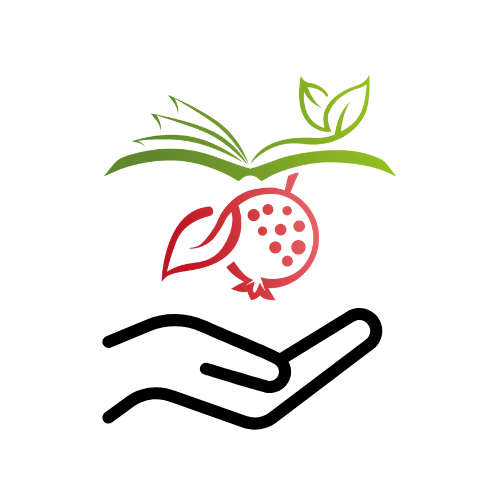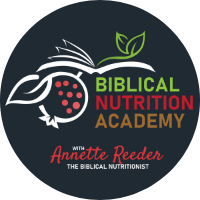
There is so much to learn from God’s Word. When it comes alive through His celebrations and festivals, we start to ask, “Why haven’t we been doing this all our life?” That’s why I’m beyond excited to share with you about celebrating Yom Kippur - the Day of Atonement - as Christians.
God’s Word is written for all of us as believers. Old Covenant, New Covenant, it all comes together when we understand these feasts of our Lord.
I’m so excited to share this with you today as part of my mission to teach you that just as we are physical, we are spiritual. And just as we are spiritual, we are physical.

These go hand in hand. That’s why as the Biblical Nutritionist I’m not only passionate about food and the treasures of healthy living, but also about God’s Word and the celebrations found within it.
Jewish tradition and holidays are blessed ingredients in God’s recipe for excellent health.
The more we understand God’s Word and it comes alive in us, the more we want to do what Jesus did. Eat what Jesus ate. Live like Jesus lived.
This is an exciting time - the High Holy Days, or the fall festivals of the Jewish people.
What Is Yom Kippur Or The Day Of Atonement

Yom Kippur, also known as the Day of Atonement, is the second in the series of High Holy Days on the fall Jewish calendar.
This is more as a solemn day as the High Priest, as described in Leviticus 16, 23, and Numbers 29, would go into the holy of holies and present the offering for the people’s sins for one year.
He would be in full garment array, gold bells on his robe alternating with pomegranate balls. Remember, pomegranates are a symbol of righteousness. And gold was a symbol of purity.
The High Priest would sprinkle blood on the mercy seat to pay for the sins of the people.
It was to be a day of great sorrow, godly repentance, and confession of sins. It was a time of mourning and self-introspection before God.
The Day of Atonement is the only day of required fasting set aside in the Bible.
The Jewish people believe the final judgement would come on the Day of Atonement.
Because of this belief, many Jewish people perform good deeds during the 10 days, which are called the 10 days of Awe. These are the days between Atonement and the Feast of Tabernacles.
Day Of Atonement In The Bible

Below aren’t the only places in Scripture we see the Day of Atonement, but they are the first and most descriptive.
Let’s bask in God’s Word for a few moments before moving on to the celebration.
Leviticus
“This shall be a permanent statute for you: in the seventh month, on the tenth day of the month, you shall humble yourselves and not do any work, whether the native, or the stranger who resides among you;
for it is on this day that atonement shall be made for you to cleanse you; you will be clean from all your sins before the Lord. Leviticus 16:29-30
Then the Lord spoke to Moses, saying, “On exactly the tenth day of this seventh month is the Day of Atonement; it shall be a holy convocation for you, and you shall humble yourselves and present an offering by fire to the Lord.
You shall not do any work on this very day, for it is a Day of Atonement, to make atonement on your behalf before the Lord your God. If there is any person who does not humble himself on this very day, he shall be cut off from his people.
As for any person who does any work on this very day, that person I will eliminate from among his people. You shall not do any work. It is to be a permanent statute throughout your generations in all your dwelling places. It is to be a Sabbath of complete rest for you, and you shall humble yourselves; on the ninth of the month at evening, from evening until evening, you shall keep your Sabbath.” Leviticus 23:26-32
Numbers
‘Then on the tenth day of this seventh month you shall have a holy assembly, and you shall humble yourselves; you shall not do any work. You shall present a burnt offering to the Lord as a soothing aroma: one bull, one ram, and seven male lambs one year old, that you have without defect;
Day Of Atonement
Yet, we as believers do not need to mourn as one without hope or one still looking for a Savior.
We have the Savior: our Great High Priest. He has already redeemed us from our sins and atoned for us as the Passover Lamb.
We have been forgiven. Remember, in Hebrews it says without the shedding of blood there’s no remission of sin.
Jesus was that blood. He was that sacrifice - once and for all.
So, why should we celebrate these days like the Jewish people who don’t recognize Jesus as the Messiah?
Well, because this is another moment where God directed the people, foreigners and aliens along with the Jewish people, to experience a Sabbath of rest.
Here are the teachings that come from the Day of Atonement, which in Hebrew is Yom Kippur.
When we teach our children and grandchildren, it helps them to see who Jesus is, why He lived, and why He died.
Plus, there’s great prophecy in these feasts of our Lord.
We want our children to understand that the world we live in is not our final home.
Our Lord is coming back. These feasts help us recognize the truth. They are a scarlet thread from the Old Covenant to the New Covenant.
Yom Kippur Meaning

Lessons to teach our families:
First, there are the two goats for sacrifice.
1 - the first was for service of God (Yahweh)
2 - the second was the scapegoat.
I highly recommend you read the story in Leviticus 16 with the whole family.
The goats would be chosen through lots. This is a perfect story to reenact.
Second, the High Priest had to sprinkle blood on the ark of the covenant for the sins committed by the people during the year.
This is a great opportunity to remind our families, as it’s recorded in Hebrews 9:11-14, Jesus stands in the place of the sacrificial Lamb. He entered once and for all in the holy place and used His own blood to cover our sins.
And not just for one year - but for every single day of our lives!
Thus, He secured our eternal redemption.
Third, review the verses about the veil in the temple being torn at the moment of crucifixion in Matthew 27:51.
This shows us we no longer need a priest to atone for our sins. We have direct access to God on our own through Jesus Christ.
Fourth, Jesus came to give us a full forgiveness of sins. In John 10:28, He says, “I give them eternal life and they will never perish.”
Fifth: future Day of Atonement.
In Zechariah 12, it says the Lord will pour out a spirit of grace and supplication. This is the day God’s chosen will see who He is. (The Jewish people and those grafted into the promise through faith in Jesus.)Day Of Atonement Meaning
Always remember Jesus fulfilled the spiritual aspects of that Day of Atonement when He went into the holy of holies with His own blood.
Jesus is our Great High Priest. The price was paid.
When we repent and believe in Jesus as our Savior, our names are permanent in the book of life, although we can still be in need of cleansing,
I am not perfect and I would guess you are not either.
Prophetically, the Day of Atonement points to the return of Jesus to judge the earth. This will fulfill the final great Day of Atonement.
Just as Christmas and Easter are the most popular Christian holidays, Rosh Hashanah and Yom Kippur are the most celebrated Jewish holidays.
Each year, Israeli airports, buses, television, and radios shut down in honor of Yom Kippur as people all over the world celebrate the holiest day of the year for the Jewish people.
Rosh Hashanah and Yom Kippur mark the High Holy Days or Days of Awe.
We just learned in the last blog post why Christians should celebrate the Feast of Trumpets: it’s the beginning of Rosh Hashanah.
The Feast of Trumpets also announces that something great is about to happen.
This begins the 10 days where Jews:
FORGIVE OTHERS
GIVE TO THOSE IN NEED
CONFESS SINS IN ORDER TO SECURE THEIR NAMES IN THE BOOK OF LIFE FOR ANOTHER YEAR
Day Of Atonement Bible Verses

God gave very clear direction concerning the Day of Atonement in Leviticus 23. These are important words for us to understand because God sent Jesus to fulfill it.
Then the Lord said to Moses, “Be careful to celebrate the Day of Atonement on the tenth day of that same month -nine days after the Festival of Trumpets.
You must observe it as an official day for holy assembly, a day to deny yourselves and present special gifts to the Lord. Do no work during that entire day because it is the Day of Atonement, when offerings of purification are made for you, making you right with the Lord your God.
All who do not deny themselves that day will be cut off from God’s people. And I will destroy anyone among you who does any work on that day. You must not do any work at all! This is a permanent law for you, and it must be observed from generation to generation wherever you live.
4 Ways Christians Can Celebrate The Day of Atonement (Yom Kippur)

How can Christians celebrate the Day Of Atonement? Here are four ways:
1. Learn the Terms
Start with the scapegoat. Read the story of the priests and how they chose the goat to carry away the sins of the people. Let your kids reenact the story.
To make the lesson more real and impactful, visit a petting zoo or farm and review the story. Bring some rocks to use as lots while there.
The High Priest is instructed to lay hands on the chosen goat while confessing the sins of the entire community, then throw the goat off a cliff.
We don’t want to reenact that part! However, the rest of the story (and maybe throwing a toy goat away) will have more of an effect on children than the reading of this powerful biblical story.
All of God’s Word is important. Sin is very serious. Our children, and we ourselves, may feel sorry for the goat and appalled by animal sacrifice, but this helps us understand all sin has to be paid for.
We don’t want to make light of sin, God’ commands, or the laws and feasts that preceded Jesus’ incarnation and being the final blood sacrifice and scapegoat.
That’s the beautiful painting of this masterpiece: Jesus came to fulfill all these requirements for sin through the cross and resurrection.
If we don’t understand, if our children don’t understand, the seriousness of sin and God’s just wrath, then we can’t fully understand the massive abundance of His grace.
This is why the entire story - found in both the Old Testament and New Testament and how one weaves into the other - is essential for understanding how loving God is.
A Hebrew word to teach is Yom Tov, which means “good day” or a generic term used to refer to any Jewish holiday.2. Forgive

The Day of Atonement starts with 10 days of Awe. They are days of seeking forgiveness. We can use these days as a time of seeking forgiveness from when we haven't acted Christ-like as well as an opportunity to recognize resentment against others and instead forgive them.
The radical forgiveness Jesus displayed ought to prompt us to also extend radical forgiveness.
In the Inner Circle coaching group, it is more often than not that a person needs to see themselves as forgiven before they can move forward with complete understanding of how deep God’s love is for them.
We hold our problems as bricks that build walls which block us from seeing God at work.
It’s time to let go of our shortcomings and see what God is doing - exceedingly, abundantly in our lives.
Anytime we say, “Yes, but I have this issue and that issue, that’s pride. We need to stop giving excuses, pause, and pray for forgiveness.
Instead, we forgive ourselves, stand up and acknowledge, “That is not me anymore. I am loved. I am forgiven. And greater is He who’s in me than he who’s in the world.”
3. Fast

Every day is a great day to fast. We fast from any obstacle that is inhibiting us from the sweetest fellowship between us and God.
The problem with our lives today is that we enjoy God’s blessings so much they interfere with seeing God himself.
Food, talents, friends, careers, nature are all great blessings – but every one of them can be a hindrance in cultivating a great relationship with God, versus just a good relationship with Him.
We thank Him for all the blessings He bestows on us, but often, “Thank You for this,” is still self-focused.
On the contrary, when we say, “Thank You, Lord, because You are the one Who blesses," our focus stays fixed on Him.
Have you considered fasting?
All family members 5 years old and up, except women who are pregnant or breastfeeding, can fast from food. Even if it’s just one meal.
Fasting can also be from our go-tos:
- tv
- internet
- books
- phones
- social media
- anything
Fasting draws us closer to God.
Consider how your family can fast together. Fasting is one the way to celebrate Yom Kippur.
As followers of Christ, we aren’t called to walk in guilt. Christ entered the Most Holy Place on our behalf and washed us clean from our sins.
Hebrews 9:14 reminds us that if that animal blood and the other rituals of purification were effective in cleaning up certain matters of our religion and behavior, think how much more the blood of Christ cleans up our whole lives, inside and out.
A great psalm to read at the end of a fast is Psalm 107:8-9:
“Let them give thanks to the Lord for his unfailing love and his wonderful deeds for mankind, for he satisfies the thirsty and fills the hungry with good things.”4. Fellowship
The Day of Atonement leads right into the Feasts of Tabernacles.
This is why it’s great to understand that the Day of Atonement was always meant to be a symbol pointing to something to come—something much greater: The promise of Christ as the ultimate, once-and-for-all sacrifice and scapegoat for our sins.
Gather with friends and family and celebrate the assurance we have in Christ! Use this time to teach the children the reminder of how Jesus came to be our High Priest.
The greatest story ever told is the story of the temple, the High Priest, the lamb, and the promises kept for us today.
God’s story from Genesis to Revelation is about His promises, provisions, and grace.

Today we get to celebrate that story.
I look forward to reading your comments and how you’ve celebrated Yom Kippur and the other fall High Holy Days.
Did you celebrate this year for the first time?
How has celebrating the Feasts of the Lord blessed you?
Please let me know below.





I am reading this in 2024. Thank you for this amazing article! I am a 67 yo female Christian and am just studying Rosh Hashanah and Yom Kippur. HALLELUJAH TO JESUS who was a once and for all sacrifice and is seated in the heavenly Tabernacle interceding for us until the day He returns as King and sets everything right! Amen!
I really appreciated and enjoyed the way that you explained the history of Yom Kippur. I am a Christian, and I always wondered if I should observe it. It was very informative, and thorough as well. Thank you very much. God bless you.